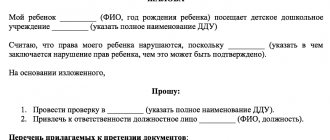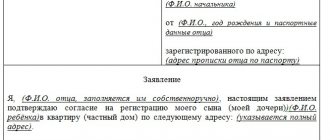Why temporary registration is dangerous for the owner, whether a registered tenant can lay claim to your home, what rights he has and what to do if a conflict arises with him, you will find out in this article.
In modern legislation of the Russian Federation, there are two terms that have replaced the outdated concept of “registration”:
- temporary registration at the place of stay;
- permanent registration at the place of residence.
Most often, temporary registration is forcedly required in the following cases:
- when preparing various documents;
- for execution of loan agreements;
- when placing children in child care institutions;
- to apply for a job in another city;
- when visiting medical institutions;
- if necessary, obtaining social benefits.
There are quite a few reasons, but the registration procedure at the place of residence, legalizing the resident, most often helps to avoid problems with the legislative framework. The only exception is if the citizen lives in close proximity to his place of permanent registration.
Deregistration at the place of residence is not provided for when registering temporarily. A certificate is issued in the form of a certificate, which has legal force only upon presentation of a passport. The certificate is issued for a certain period, adopted by mutual agreement of the owner and tenant.
The deadlines can be any, and they can be extended if necessary. This permit allows you to avoid fines for violating the law, confirms the right of residence, but excludes the right to dispose of housing.
Upon expiration of the temporary registration period, the citizen will be deregistered automatically. In this case, there is no need to contact the Federal Migration Service. If the tenant leaves ahead of schedule, then an application for deregistration must be written to the passport office.
Risks of temporary registration for the owner
Despite the fact that the right of ownership is well protected by the laws of Russia, there are certain dangers for the owner of a living space when registering on a non-permanent basis:
- if the apartment does not have appropriate metering devices, then utility bills will increase several times;
- until the contract expires, purchase and sale transactions will not be possible;
- when preparing documents using mail and online services, there is a risk of completing a transaction without the consent of the owner;
- there is a possibility of residents refusing to voluntarily vacate the occupied premises, as well as their immoral behavior;
- there may also be a risk of residents using the provided premises for other purposes, causing property damage to the owner’s property;
- residents' reluctance to pay utility bills;
- the likelihood of subletting the apartment.
The right to own housing will not pass to another citizen only upon registration, therefore registration at the place of residence will not give him the right to claim a share in the apartment. Despite this, when drawing up a residence agreement under the terms of temporary registration, you need to take into account all the subtleties and nuances of this procedure.
Payment for housing services
Registration of strangers on the territory of your home can increase the cost of utility bills, which many landlords are afraid of.
According to Art. 30 of the Housing Code of the Russian Federation, the obligation of the property owner is to maintain his home, except for the circumstances specified in the Federal Law or an agreement with a service company.
If the apartment does not have meters and additional residents move in, payments for electricity, gas and water may increase.
These costs also increase automatically due to the fact that more people use household services.
All other indicators do not affect housing and communal services payments. The homeowner can agree with the tenant to reimburse part of the utilities.
Important: if the tenant or other person legally residing in the house has agreed with the owner on the payment of housing and communal services expenses at the expense of the tenant, this fact should be indicated in the agreement. Otherwise, the apartment owner will not be able to legally demand compensation for payments.
Pitfalls when registering children
The current legislation of the Russian Federation obliges children to be registered at the place of registration of their parents, regardless of the permission of the owner of the residential premises. Therefore, temporary registration of minors can have negative consequences for the homeowner.
A citizen can register his child for a time exceeding the period of his registration, which is quite likely to happen both due to the lack of regulations governing the standards for registering children, and due to the inattention of migration service employees. As a result of such an error, the parent can, through the courts, re-register at the address where the child is registered. Selling, donating, or re-registering in some other way an apartment in which children are registered is very problematic, especially if it is rented for a long period without carefully spelled out conditions for early cancellation of the contract.
If the parents do not have another registration, it will be problematic to register them and the child in the future. At the first consideration of the case, the court may refuse to discharge, citing the fact that in this case the child will remain on the street.
To avoid such a situation, before the registration procedure it is necessary to find out about the existence of minor family members of the person being registered. If registered residents have a child, it is advisable for the apartment owner to be personally present at the migration service office in order to be able to track the dates of registration of the children and their parents.
How are disputes resolved?
The owner’s consent to the registration of strangers at his address does not reduce the risks of further proceedings. The owner of the house has the right:
- sell residential premises;
- evict guests for improper actions and failure to comply with the terms of the agreement, as well as due to complaints from neighbors;
- obtain information about the entry into the apartment of people not specified in the contract.
But at the same time, the desire to evict residents after the end of their temporary registration period is fraught with consequences in the form of disputes. Such problems are resolved through the court, and the claim must be filed in the territory where the property is located.
It is unlikely that the owner will lose his home as a result of disputes, but he may spend a lot of time and money. The owner of the property changes only if a purchase and sale agreement is concluded, a deed of gift is signed and other procedures in which property rights are transferred. Such transactions must be recorded in the State Register.
Dangers of registering foreigners
Any foreigner who comes to Russia for more than a week is required to register at the place of stay. Violation of this law entails serious administrative penalties ranging from fines to deportation from the country for up to five years.
According to the rules of the migration service, issues of registration at the place of stay are dealt with by the party receiving guests from abroad. Refugees, after receiving the status of forced migrants from the Federal Migration Service or the migration departments of the Ministry of Internal Affairs, register on a general basis.
Homeowners who register foreign citizens in their homes expose themselves to a certain risk.
In any conditions, they will remain the owners of the apartment, but several unpleasant moments may well happen:
- Firstly, in addition to the previously mentioned problems, such as increasing the rent, the inability to sell the apartment, and the registration of minors in the living space, the owner faces the risk of administrative liability for failure to provide information about registered foreigners to the migration authorities. Moreover, this applies to foreign citizens both from near and far abroad countries.
- Secondly, an administrative penalty will be imposed in the event of filing false information about the registration of foreigners, that is, if the registered foreign nationals do not actually live in the specified living space.
- Thirdly, having registered a citizen of another country in his living space, the home owner begins to bear civil liability to third parties, in particular neighbors, in the event of damage to their property.
Thus, registration, informing authorities, and monitoring of residence fall entirely on the shoulders of the owner, and he bears full administrative responsibility for the following points:
- providing information to the migration service authorities about the arrival of a foreign citizen;
- reporting to control authorities about the movements of a foreign citizen;
- control over compliance with the rules of residence;
- settlement of arising property conflicts with third parties.
For this reason, it is recommended that homeowners conclude a contract of civil liability insurance to third parties or take out insurance for the premises themselves. The cost of these expenses can be included in the rent.
Rights and obligations of a temporarily registered resident
The rights of citizens registered temporarily are similar to those they receive at their place of permanent registration:
- the right to be present and live in this area;
- register your underage children at this address without the consent of the owner and other interested parties.
However, these citizens do not have an independent right of use, since the owner of the apartment bears responsibility for their actions, and therefore temporary residents have responsibilities:
- use the provided premises strictly for its intended purpose;
- maintain its appearance and integrity;
- respect the rights and interests of neighbors;
- adhere to fire safety, sanitary and environmental requirements;
- voluntarily move out of the apartment after the expiration of the period of residence.
Is it possible to sell an apartment with a temporary registration?
Theoretically, it is possible to sell an apartment with temporary residents registered in it (since an extract from the house register is now not required when registering a transaction), and the consent of the latter is not required for this. But in practice it is unlikely, since few people will want to buy such an apartment, because it is burdened with the registration of strangers. This means that after purchasing housing, the new owners will have to share it with strangers, since they have the right to use it.
For the seller
Although there is still one guaranteed way that will help sell an apartment with an encumbrance in the form of a non-permanent registration. This is an application to a real estate agency that specializes in the sale of “problem” housing. Such agencies buy apartments at almost half the price of their market value, or undertake to find a suitable client, charging 40-50% of the transaction cost for their services.
For the buyer
Before purchasing, the buyer should carefully study the contract and request from the seller an extract from the house register, where all registered persons are indicated (i.e., so that there are no registered persons). Because there are often cases when a transaction has already been completed, and later it turns out that someone else is registered in the purchased property. But even if you happen to buy encumbered real estate, there is always a way out.
- Option 1. Forcibly evict temporarily registered persons from their apartment by filing a lawsuit in court.
- Option 2. Again - through the court - but using a different procedure. You need to ask that the transaction be declared void if the contract did not say anything about temporary residents registered at your address. If the demands are satisfied, it means that the apartment is returned to the seller, and the money is returned to the buyer.
Owner's responsibilities
According to the laws of the Russian Federation, the owner of a home has the full right to provide his premises for residence to other persons, but at the same time he is obliged to ensure that they have registration at the place of residence.
If the owner interferes with this, the consequences for him may be as follows:
- administrative punishment in the form of a fine;
- application of a citizen living on the basis of a lease agreement to the court to obtain permission for temporary registration;
- self-registration by the employer with the Federal Migration Service on the basis of a rental agreement.
Such liability can be avoided only if those living in the apartment have permanent registration in a given city or are close relatives of the owner of the property.
Can the owner of a private house temporarily register someone with him?
Yes, this procedure is no different from registering an apartment - it is carried out according to the same rules and in the same order. The tenant and the owner acquire a similar scope of rights and obligations. The only difference is that the migration department may require an extract from the house register to the “apartment” list of documents for registration:
- formal application;
- passport of the temporarily registered person;
- certificate of ownership or lease agreement, or written permission from the owner to register.
However, registration will not be possible if the house:
- not put into operation (no corresponding act);
- built on lands not intended for individual housing construction;
- documented as a dacha;
- is joint property and its shares are not allocated in kind unless there is consent to registration from the co-owners.
Rent amount
An increase in the amount of utility bills during temporary registration is determined only by the presence of individual water, gas and electricity meters. If there are no meters, then the calculation is made in accordance with the standards, which are multiplied by the number of residents registered in a given residential area.
The following categories are not tied to the number of people living in the apartment:
- payment for heat energy;
- housing maintenance;
- waste removal and disposal.
The cost of these services is calculated from the total area of the housing. If the apartment is equipped with metering devices, then the increase in rent will depend only on the meter readings.
To avoid misunderstandings, payment issues must be discussed with residents in advance, since temporary registration and utility payments are directly related to each other.
Difficulties in eviction
Temporary registration is not the official place of residence of a person, it is just registration at the place of actual residence, which automatically terminates upon expiration of the period prescribed by the migration service. Therefore, the owner of the property should not have any difficulties with eviction.
If the period has expired, and persons registered on a non-permanent basis are not evicted, the owner has every right to resolve the issue by applying to the courts of general jurisdiction at the location of the disputed property. If the court finds that the period has indeed expired and the tenants are occupying the premises illegally, forced eviction will be applied to them.
Temporarily registered minors and incompetent persons are evicted on the same grounds.
Why do you need registration?
If citizens plan to stay at their new place of residence for more than 90 days, then they are required to appear at the migration service and register (Article 9 of Federal Law No. 5242-1). After completing the procedure, the authorities issue a certificate confirming that the citizen legally resides at a certain address.
What rights does the document give:
- officially get a job; in some cities, employment requires mandatory registration in the city;
- Having this form in hand, it is easy to obtain registration for a school or kindergarten;
- You can receive medical care at a clinic, but you will first have to be assigned to the facility;
- receiving statutory social benefits and various benefits.
Important! A temporary registration form is issued for a specific period (month, six months or a year), the period depends on the agreement between the owner and the tenant. The document is considered valid upon presentation of a passport at the same time.
Grounds for forced eviction of a tenant
In cases where the registration period has not yet expired, but it is necessary to evict the tenant, it is enough to submit an application to the FMS, where it is necessary to indicate the details of the applicant, documents confirming his rights to the apartment, details of the person to be discharged and the reason why the citizen needs to be discharged.
Reasons for deregistration may include the following circumstances:
- a court decision on deprivation of liberty, immediately after the citizen’s sentence comes into force, can be removed from the registration register;
- after a court decision declaring a person dead or missing has entered into force;
- eviction from housing by court decision;
- registration at another place of residence;
- providing false or forged documents;
- violation by residents of the rules of residence.
Resolution of controversial situations
The practice of court cases shows that there have been no cases of loss of property rights due to temporary registration of residents; all controversial issues are resolved by the courts in favor of the owner of the property.
All complex controversial issues that arise when solving housing problems are resolved in court. Full ownership of the living space belongs to the owner, and he has the right to decide issues of registration and deregistration at his own discretion.
Most often, appeals to the courts regarding registration at the place of residence occurred for the following reasons:
- disagreement to voluntarily vacate the premises;
- behavior of residents that violates the rules of residence;
- refusal to pay utility bills;
- registration took place without the consent of the owner;
- if there are controversial issues regarding the timing of registration.
The last two reasons may arise when sending an application to the FMS by Russian Post or using electronic services. Other situations require the presence of the owner during registration, who in this case can control the designation of the registration period noted in the application for registration at the place of stay.
To avoid controversial situations and judicial red tape, you must adhere to several rules:
- be vigilant and check with all possible sources the people for whom registration is being issued;
- study the legislative framework, all the intricacies of concluding contracts;
- It is imperative to conclude a lease agreement, preferably for a short period, in order to avoid unpredictable situations.
How are minors registered?
Registration documents are submitted by parents of minors along with their documents. The procedure is free for all citizens. The list of documents for temporary registration of children is quite short:
- An application filled out by the legal representative of the minor on the prescribed form.
- A copy of the birth certificate with the reverse side showing the citizenship stamp. If the child permanently resides abroad, then his foreign passport is presented.
- Children over 14 years of age submit a copy of their Russian passport.
Within 3 days, the FMS authorities check all the information provided along with the application, and after that they issue certificates of temporary registration. You can also submit documents remotely (by mail, through the government services portal), but you can obtain certificates only by visiting a FMS office.
If a minor is not yet 14 years old, he can only be registered at the place of permanent or temporary registration of his parent (legal representative). Persons over 14 years of age can register without parents. In this case, the package of documents is expanded with the written consent of the parents of the minor or his other legal representatives for temporary registration at the specified address.
It is important to note that consent from both parents is required for temporary registration . If there is no agreement between the parents on this issue (one is for registration, and the other is against), then the issue is resolved in court, since the ordinary procedure does not provide a general solution for disputes of this kind.
It is also noteworthy that deregistration at the place of permanent registration of a minor is not required . The law does not prohibit having permanent registration at one address, while registering temporarily at a completely different address. The certificate of temporary registration must indicate the period during which it is valid. After its expiration, the minor must be temporarily registered at some other or the same address, or within 7 days leave for the place of his permanent registration.











